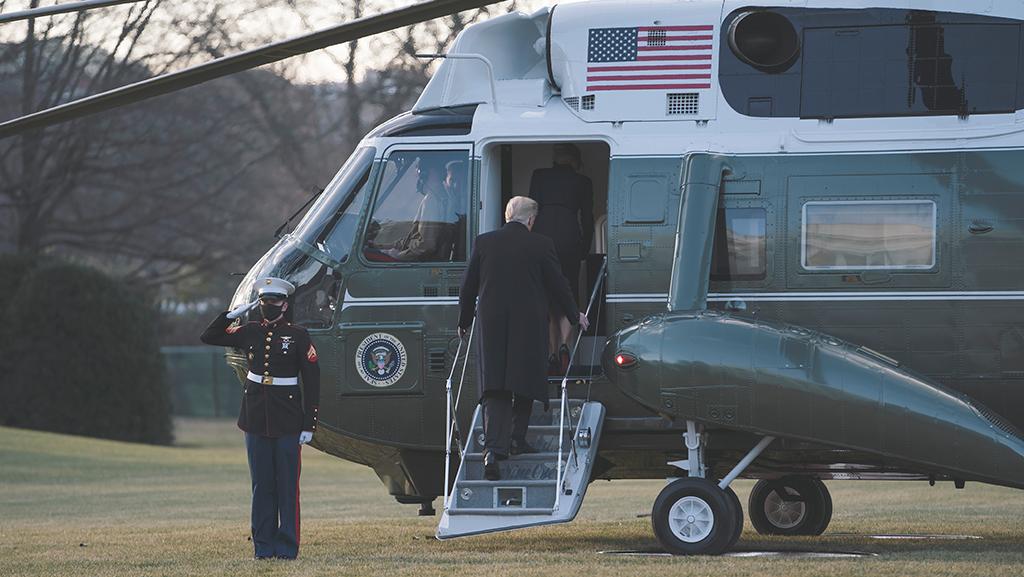The Ironies Of Trump And Biden On China May Be Good For Aerospace | トランプ・バイデン両政権の対中政策、航空産業に意外なメリットをもたらすか

バイデン新大統領の就任により、コロナ危機からの回復を加速させる中国と、その比較的強いといえる経済は、エアバス社やボーイング社とそのサプライヤーにとって重要な役割を果たすことが、業界関係者の間で明らかになってきた。トランプ政権が乱発した中国に対する強硬な大統領令、そしてバイデン政権もすぐには方向転換しないという政権内部からの情報にも関わらず、だ。
アメリカで有名なある航空宇宙防衛コンサルタントは、「バイデン政権が貿易の自由化よりも、保護主義政策に近付いていくとは誰が予想しただろうか。慌てずに、政権がどのような方針を取っていくのか見極めよう」とAviation Weekに対し語った。
一例として、トランプ前大統領が退任直前に規制強化を発表した中国投資禁止令では、いくつかの航空宇宙防衛関連企業を含む中国企業との取引を規制しているものの、西側の航空産業が中国と行っているビジネスに大きな影響は及ばさないかもしれない。たしかに、トランプ政権は「中国共産主義の軍事企業(Communist Chinese Military Companies:CCMC)」や「最終使用者としての軍(Military End Users:MEU)」などを記載した禁止リストと、その膨大な公式説明を発行した。しかし、暫定的なレビューの範囲では、アメリカ企業によるComac C919への部品供給や、ボーイング737、エアバスA320などの完成ラインへの部品供給に影響を及ぼすような障害があるのか、まったく不明なのだ。
1月20日、Akin Gump社のアドバイザーは「名称や、根本的な政策上の懸念事項は似通っているが、各企業に対する禁止事項の範囲や根拠はまったく異なる。片方のリストに載っているからといって、必ずもう片方にも載っているとは限らないが、リストが拡大していくにつれて両方に記載される企業も出てくるだろう」と述べた。
たとえば、CCMCを対象とした規制では、2021年11月11日時点でアメリカ人やアメリカ企業が禁止リストに掲載された企業を所有したり、有価証券に投資することを禁止している。このリストには、明らかな中国軍向け軍需企業であるAvic社は含まれているが、Comac社や主要子会社6社(上海航空機製造(SAMC)など)は含まれていない。さらに、Akin Gump社によれば、財務省のCCMC規制ではCCMC各社への投資は禁止しているが、輸出は禁止されていない。
実際、トランプ政権による「航空産業に関する説明」と呼べるようなものはMEUリストのQ&A項目の中に埋もれており、SAMCを含むいくつかの会社が挙げられている。質問には「輸出者はどのようにして、輸出先の個人や企業が『最終使用者としての軍』に 『支援または貢献』していると判断すればよいのか。たとえば、アメリカ企業は国有企業を含む中国企業に対して、民間機製造に必要な(商務省による)規制物品を輸出してきた」とある。
それに対する回答を一言で表すなら「自分で調べよ」というもので、商務省当局者は「最終使用者が民間目的でしか利用しないのであれば、MEUにはあたらないだろう。よって、最終使用者の活動内容を確実に把握し、MEUにあたるかを判断する必要がある」と答えている。ちなみに、前出の商務省による輸出許可はMEUに該当するかを判断する基準にはならないと付け加えた。
中国で急成長する民間航空産業から、アメリカ企業が大急ぎで身を引くようなことは考えにくい。ワシントンの戦略国際問題研究所(CSIS)が12月に発行したレポートによると、C919の主要サプライヤーの5分の3近くはアメリカ企業で、3分の1近くはヨーロッパ企業だ。主要サプライヤーのうち中国企業は14社のみで、うち7社は西側企業とのジョイントベンチャーである。
一方、 Bloomberg Intelligence社のアナリストは1月26日、中国はボーイング社やエアバス社にとって最も重要なマーケットのひとつだと指摘した。例年300機近くの737やA320がデリバリーされており、ほぼ同数の受注残もあることから、実績と機会のバランスが取れている。言い換えれば、2021年以降のデリバリー数と生産率を左右するのは中国だということだ。たとえ GDP成長率6%という「控えめな」予想をした場合でも、中国では今後5年間で少なくとも264機もの新造機が必要になる計算だ。
2019年にトランプ政権が中国と交わした貿易合意の「第1段階」では、2020年に329億ドル、2021年には448億ドルの追加購入を求めており、Bloomberg社のアナリストは「航空機抜きでこの金額を達成するのは難しいだろう」と話す。
トランプ前大統領はこのことを理解しており、バイデン大統領も同様だろう。トランプ氏は中国との航空機ビジネスを恒久的に困難な形にはしなかったが、バイデン大統領はより規制を厳しくするのか、それとも緩和するのか、まだ未知数だ。もちろん、市場原理に基づき、両者が航空ビジネスで適切な利益を受けられるような形での規制緩和が望まれる。
Aviation Week Intelligence Network (AWIN) のメンバーシップにご登録いただくと、開発プログラムやフリートの情報、会社や連絡先データベースへのアクセスが可能になり、新たなビジネスの発見やマーケット動向を把握することができます。貴社向けにカスタマイズされた製品デモをリクエスト。
As President Joe Biden settles into the Oval Office, it is becoming clear to industry observers that China’s accelerated recovery from COVID-19 and its relatively stronger economy will play an important role for Airbus, Boeing and their suppliers. This prospect seems likely despite the Trump administration’s flurry of anti-China business directives as well as the surprising revelation via cabinet confirmation hearings that Biden might not immediately alter the vector.
“Who would have thought that the Biden administration would have been moving closer to protectionist policy rather than global trade liberalization policy,” a well-known U.S. aerospace and defense consultant tells Aviation Week. “Keep your powder dry, and let this sort out to see where this administration is going to settle in,” he advises.
For one thing, the proclamations former President Donald Trump made just before leaving office might not have a significant effect on Western aerospace business with China, even though they seemingly imposed prohibitions against U.S. companies and citizens doing business with Chinese companies, including several in the aerospace and defense industry. Yes, Trump issued several new blacklists—e.g., Communist Chinese military companies (CCMC), military end users (MEU) and others—along with pages of official explanations in the final days of his administration. But a preliminary review leaves it wholly unclear whether any new roadblocks were placed on the numerous U.S. providers supplying the Comac C919 or finishing lines for Boeing 737s, Airbus A320s or other aircraft.
“Although the names and underlying policy concerns are similar, the scope and source of the prohibitions regarding each set of Chinese entities are quite different,” Akin Gump advisors said on Jan. 20. “Companies on one of the lists are not automatically on others, but overlap is possible as the lists evolve.”
The CCMC directive, for instance, prohibits Americans and U.S. companies from owning the blacklisted companies or investing in their securities as of Nov. 11, 2021. The list includes obvious entities such as Chinese military provider Avic but not Comac or any of its six major subsidiaries such as Shanghai Aircraft Manufacturing Co. (SAMC). Furthermore, while the Treasury Department’s CCMC rule prohibits investing in CCMCs, it does not ban exports to them, according to Akin Gump.
Indeed, the closest the Trump administration came to explaining anything for aerospace was buried in a question-and-answer for the MEU list, which named SAMC, among others. “How can exporters determine whether a person’s or entity’s actions or functions are intended to ‘support or contribute to’ a ‘military end use’?” a questioner asked. “For example, U.S. companies have been exporting [Commerce Department]-controlled items to Chinese companies, including state-owned enterprises, for the manufacture of parts for end use on commercial aircraft.”
The answer: You tell us. “If the specific end user to receive the item is engaged exclusively in civilian work, it would not be an MEU,” Commerce officials responded. “Thus, you must ascertain the activities of the specific end users in determining whether the intended end user is an MEU.” By the way, prior Commerce export licensing is not an indicator of being an MEU or not, they added.
It seems doubtful U.S. companies will rush to eject themselves from China’s commercial aerospace ascendancy. According to a December report from the Center for Strategic and International Studies in Washington, almost three-fifths of top C919 suppliers are U.S. companies and almost one-third are European. Only 14 key suppliers are from China, and seven of those are Chinese-Western joint ventures.
Meanwhile, as Bloomberg Intelligence analysts noted on Jan. 26, China is one of the most important markets for Boeing and Airbus; it supports close to 300 737 and A320 deliveries a year, historically, with respective backlogs showing an almost equal number of orders, thus balancing the opportunity for deliveries. In other words, China is key for OEM deliveries and build rates in 2021 and beyond. Even a “low-growth” scenario of 6% GDP likely means China would need at least 264 new aircraft over the next five years.
Trump’s 2019 Phase 1 agreement called for an additional $32.9 billion in Chinese purchases in 2020 and $44.8 billion more this year. “It will be difficult or impossible to meet the levels without aircraft,” the Bloomberg analysts observe.
Trump knew this, and likely so does Biden. Trump may not have made aerospace work with China any harder on a permanent basis, and it is questionable whether Biden will do so or simply try not to be as confrontational as his predecessor. Less confrontation would be welcome, of course, so that market forces can play out and both sides can benefit from the aerospace trade.
Editor's note: This column was edited to clarify the date when Americans and U.S. companies are prohibited from owning the blacklisted companies or investing in their securities.